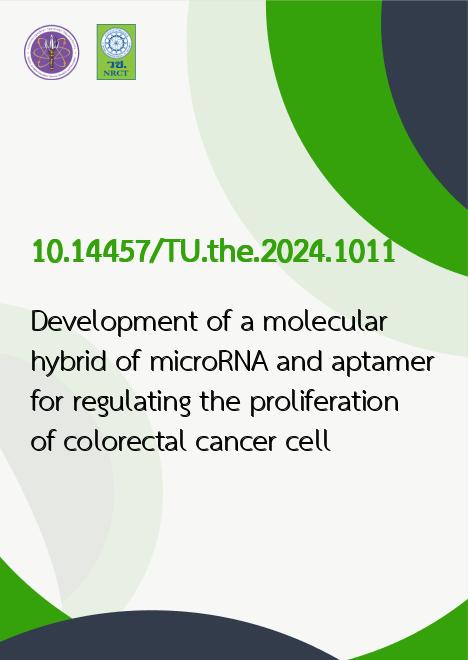
|
Development of a molecular hybrid of microRNA and aptamer for regulating the proliferation of colorectal cancer cell |
|---|---|
| รหัสดีโอไอ | |
| Title | Development of a molecular hybrid of microRNA and aptamer for regulating the proliferation of colorectal cancer cell |
| Creator | Khanittha Laowichuwakonnukul |
| Contributor | Pichayanoot Rotkrua, Advisor |
| Publisher | Thammasat University |
| Publication Year | 2567 |
| Keyword | MicroRNA-143, AS1411 aptamer, Colorectal cancer, SDDSs, ไมโครอาร์เอ็นเอ-143, แอพทาเมอร์ AS1411, มะเร็งลำไส้ใหญ่, ระบบนำส่งยาอัจฉริยะ |
| Abstract | KRAS is considered to be the most common oncogenic gene in human cancers. KRAS mutations are found in approximately 50% of colorectal cancer (CRC), so KRAS is one of the therapeutic targets for cancer drug development. KRAS is well-known to be targeted by tumor-suppressor miR-143. An increase in miR-143 expression is a promising way to inhibit CRC cell growth. Besides, there are several limitations to existing treatments, including unwanted side effects. Smart drug delivery systems (SDDSs) are potential methods for improving treatment efficiency. This research aims to develop an anticancer drug carrier, a molecular hybrid (MAH). The MAH was produced by combining miR-143 and AS1411 aptamers through a hybridization strand and loading doxorubicin (Dox), a chemotherapy drug. The uptake capability of MAH into the CRC SW480 cells was confirmed by detecting fluorescence intensity with a fluorescence microscope. After treatment of MAH in SW480 cells, the expression levels of miR-143 and KRAS mRNA were detected using an RT-qPCR assay, while the KRAS protein level was measured using a western blot analysis. MTS assay was used to determine cell viability, and flow cytometry was performed to assess cell apoptosis following Dox-MAH treatment. The downstream target proteins of KRAS, ERK and AKT, and apoptosis-related proteins, procaspase-3, Bax and Bcl-2, were evaluated using a western blot analysis. The results revealed that the level of miR-143 was increased, but KRAS expression was decreased for both mRNA and protein. ERK and AKT proteins were downregulated as well. Furthermore, treating cells with Dox-MAH resulted in the inhibition of cell proliferation and induction of apoptosis. The expression of procaspase-3 and Bcl-2 was decreased, while Bax was increased, confirming that Dox-MAH triggered the cell apoptosis. The success of this research proposed a new strategy for drug delivery systems. Dox-MAH had multiple functions simultaneously; CRC cell-specificity, Dox carrier, and miR-143 delivery. Therefore, therapeutic efficacy could be increased and off-target toxicity would be decreased due to SDDSs' ability to target cancer cells but not harm healthy cells. |